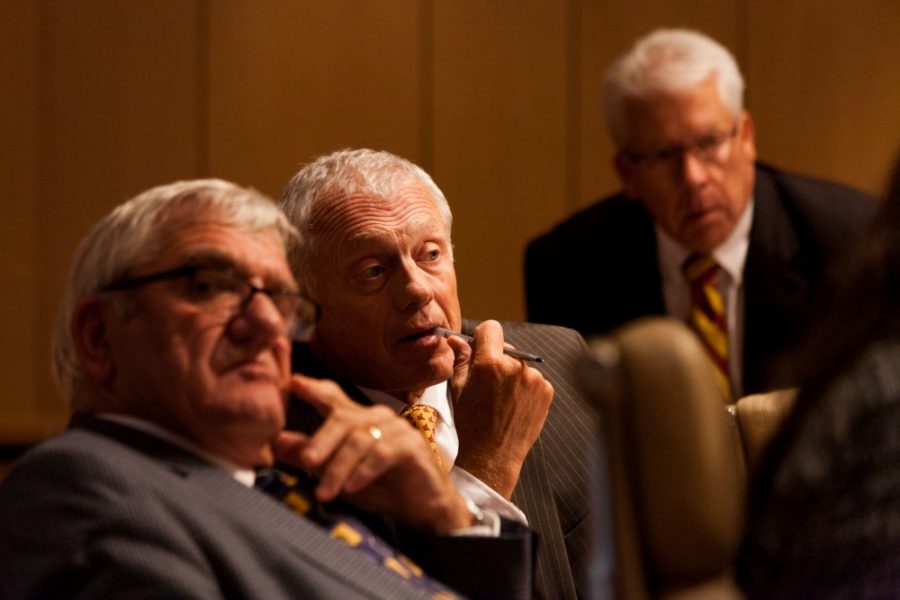The University of Minnesota Board of Regents wrapped up its first meeting of the academic year Friday after beginning its final session with an unexpected guest — a brief protest from a campus workers union.
Apart from the protest, the two days of meetings largely consisted of informational items about the University’s dining contract, its next capital request from the state and how the University seeks to emphasize programs focused on the environment.
Union workers protest
Shortly after the at-large board meeting began, a group of University clerical workers from the AFSCME Local 3800 workers union entered, donning matching shirts and carrying signs in a demonstration demanding pay increases and fairer treatment.
The union’s Vice President Stephanie Taylor addressed the board with a brief speech, saying the workers have felt unheard by the University during contract negotiations. Taylor claimed that University President Joan Gabel has refused to meet with them to discuss their concerns.
While the union has hopeful expectations for their ongoing relationship with Gabel, they are disappointed with the lack of contact with her, Taylor said.
“Appropriate University representatives have been part of scheduled and planned labor negotiations, as is the typical process. We believe in the negotiation process and have every reason to believe that it will lead to a collective bargaining agreement,” said University spokesperson Meagan Pierluissi in a statement to the Minnesota Daily.

Examining the U’s dining contract
Regents discussed renewing the University’s contract with its food service provider, Aramark, which runs through June 2020. This renewal would allow officials time to decide how they want to operate food services moving forward, weighing the option of handling it in house.
Aramark has received criticism from the Minnesota Student Association for a lack of food options and employee workplace conditions. MSA members have said they would prefer the University do its own food service.
“When it comes to food, it’s difficult to make 50,000 people happy,” said Mike Berthelsen, vice president of University Services at the meeting, noting that while the University has made improvements, that work is never done.
Gabel recommends approving the contract for up to two years while they weigh the options in the longer term. Regents will take action on extending the contract at their October meeting.
Upcoming state capital request
University officials presented a $317.2 million capital request from the state which prioritizes $200 million in Higher Education Asset Preservation and Replacement funding meant for basic upkeep of buildings across the system.
“HEAPR really is our main defense against poor and critical condition buildings,” Berthelsen said at the meeting. “We have a large list of projects that we would tackle with our $200 million request.”
This spring, the state failed to provide any of the University’s capital request as the bonding bill died in the legislature. At the meeting Brian Burnett, senior vice president for finance and operations, said preliminary discussions with budget officials in the governor’s office “seemed receptive” to the request.
Emphasizing the environment
The University added 37 new academic programs systemwide in 2019 and stopped offering 14. Karen Hanson, executive vice president and provost, highlighted several programs focused on the environment.
“The creation of a new program does not necessarily translate to new costs, nor does the discontinuation of programs directly translate into the saving of resources,” Hanson said at the meeting.
Faculty presenting at the meeting emphasized the interdisciplinary aspects of studying environmental topics, saying it requires an “all-hands-on-deck” approach. The goal of these undergraduate degrees isn’t just to prepare students for the workforce or graduate school, but to ensure students have an array of paths they can take.
“The pipelines of those new methods that are used in the corporate world … start at universities,” said Joseph Knight, a professor in the Department of Forestry Resources, at the meeting. “We are not only monitoring what’s going on, we’re involved, faculty in general, in the very early stages of development.”
















